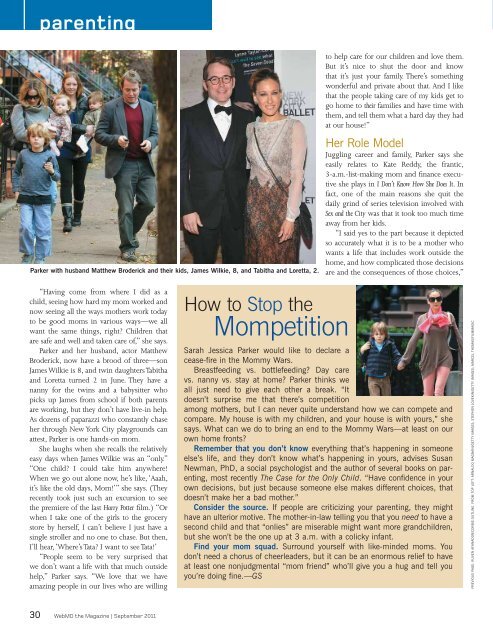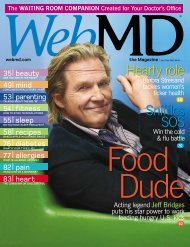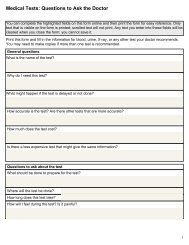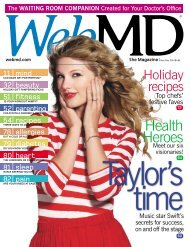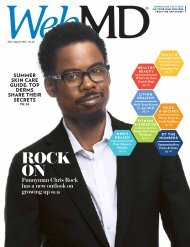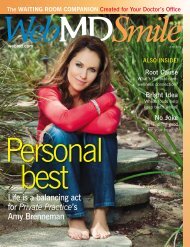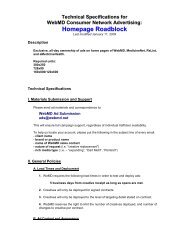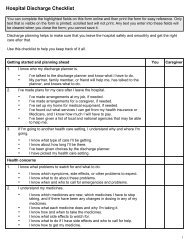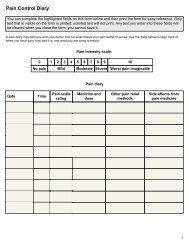Create successful ePaper yourself
Turn your PDF publications into a flip-book with our unique Google optimized e-Paper software.
parenting<br />
parenting<br />
Parker with husband Matthew Broderick and their kids, James Wilkie, 8, and Tabitha and Loretta, 2.<br />
“Having come from where I did as a<br />
child, seeing how hard my mom worked and<br />
now seeing all the ways mothers work today<br />
to be good moms in various ways—we all<br />
want the same things, right? Children that<br />
are safe and well and taken care of,” she says.<br />
Parker and her husband, actor Matthew<br />
Broderick, now have a brood of three—son<br />
James Wilkie is 8, and twin daughters Tabitha<br />
and Loretta turned 2 in June. They have a<br />
nanny for the twins and a babysitter who<br />
picks up James from school if both parents<br />
are working, but they don’t have live-in help.<br />
As dozens of paparazzi who constantly chase<br />
her through New York City playgrounds can<br />
attest, Parker is one hands-on mom.<br />
She laughs when she recalls the relatively<br />
easy days when James Wilkie was an “only.”<br />
“One child? I could take him anywhere!<br />
When we go out alone now, he’s like, ‘Aaah,<br />
it’s like the old days, Mom!’” she says. (They<br />
recently took just such an excursion to see<br />
the premiere of the last Harry Potter film.) “Or<br />
when I take one of the girls to the grocery<br />
store by herself, I can’t believe I just have a<br />
single stroller and no one to chase. But then,<br />
I’ll hear, ‘Where’s Tata? I want to see Tata!’<br />
“People seem to be very surprised that<br />
we don’t want a life with that much outside<br />
help,” Parker says. “We love that we have<br />
amazing people in our lives who are willing<br />
How to Stop the<br />
Mompetition<br />
to help care for our children and love them.<br />
But it’s nice to shut the door and know<br />
that it’s just your family. There’s something<br />
wonderful and private about that. And I like<br />
that the people taking care of my kids get to<br />
go home to their families and have time with<br />
them, and tell them what a hard day they had<br />
at our house!”<br />
Her Role Model<br />
Juggling career and family, Parker says she<br />
easily relates to Kate Reddy, the frantic,<br />
3-a.m.-list-making mom and finance executive<br />
she plays in I Don’t Know How She Does It. In<br />
fact, one of the main reasons she quit the<br />
daily grind of series television involved with<br />
Sex and the City was that it took too much time<br />
away from her kids.<br />
“I said yes to the part because it depicted<br />
so accurately what it is to be a mother who<br />
wants a life that includes work outside the<br />
home, and how complicated those decisions<br />
are and the consequences of those choices,”<br />
Sarah Jessica Parker would like to declare a<br />
cease-fire in the Mommy Wars.<br />
Breastfeeding vs. bottlefeeding? Day care<br />
vs. nanny vs. stay at home? Parker thinks we<br />
all just need to give each other a break. “It<br />
doesn’t surprise me that there’s competition<br />
among mothers, but I can never quite understand how we can compete and<br />
compare. My house is with my children, and your house is with yours,” she<br />
says. What can we do to bring an end to the Mommy Wars—at least on our<br />
own home fronts?<br />
Remember that you don’t know everything that’s happening in someone<br />
else’s life, and they don’t know what’s happening in yours, advises Susan<br />
Newman, PhD, a social psychologist and the author of several books on parenting,<br />
most recently The Case for the Only Child. “Have confidence in your<br />
own decisions, but just because someone else makes different choices, that<br />
doesn’t make her a bad mother.”<br />
Consider the source. If people are criticizing your parenting, they might<br />
have an ulterior motive. The mother-in-law telling you that you need to have a<br />
second child and that “onlies” are miserable might want more grandchildren,<br />
but she won’t be the one up at 3 a.m. with a colicky infant.<br />
Find your mom squad. Surround yourself with like-minded moms. You<br />
don’t need a chorus of cheerleaders, but it can be an enormous relief to have<br />
at least one nonjudgmental “mom friend” who’ll give you a hug and tell you<br />
you’re doing fine.—GS<br />
previous page: Ruven Afanador/Corbis Outline. From top left: Arnaldo Magnani/Getty Images; Stephen Lovekin/Getty Images; Marcel Thomas/FilmMagic<br />
Courtesy of UNICEF<br />
Parker has been a UNICEF<br />
ambassador since 1997.<br />
4 Ways You Can Help Sarah Jessica<br />
Care for Kids Across the World<br />
They’re known as the deadly triad. Malnutrition. Dirty water. Infectious disease. Together,<br />
these three plagues take the lives of thousands of children every day in the developing<br />
world. “They all go hand in hand in a sort of vicious cycle,” says Deborah Dean, MD,<br />
MPH. “By far the biggest cause of preventable deaths in the developing world is infectious<br />
disease, with diarrhea alone accounting for about 17% of preventable deaths in childhood.”<br />
(Measles and malaria are two of the other leading killers.)<br />
Every day, 22,000 children under 5 years old around the world die from preventable<br />
causes like these. “Five thousand children die every day just due to lack of access<br />
to good, clean, healthy water,” says UNICEF’s Caryl Stern. And once they’re fed, clothed,<br />
and housed, children are still vulnerable in dozens of ways. “Every child deserves a childhood,<br />
but there are thousands of children being forced into trafficking, slavery, and soldiering,”<br />
Stern says. But the situation is improving: Just a year ago, the daily death toll from<br />
preventable causes was 24,000 children. Indeed, over the last 50 years, UNICEF and its<br />
partners have cut child mortality in half through programs in almost 200 countries providing<br />
children with health care, clean water, nutrition, education, protection, and emergency<br />
relief. But there’s still a long way to go.<br />
How can you help support programs that make a difference for children? A few ideas:<br />
Organize a Trick-or-Treat for UNICEF event at your children’s school for Halloween. You<br />
can get kits, tips, and resources online at youth.unicefusa.org, including handbooks and<br />
guidelines for teachers. You can also set up an online fundraising page.<br />
Give an “inspired gift” (inspiredgifts.org). On your mom’s birthday, honor her by buying a<br />
blanket for a child.<br />
Support Water Aid, an organization whose sole purpose is to improve access to safe water<br />
and sanitation throughout the world (www.wateraid.org). The “shop for life” section lets<br />
you earmark your donation for useful items ranging from faucets to a composting toilet.<br />
Help other moms keep their families alive and healthy with CARE, a humanitarian group<br />
fighting global poverty that focuses on women, believing they have the power to help whole<br />
communities reach self-sufficiency. Its website lets you drag and drop gifts into a personalized<br />
“CARE package” (www.carepackage.org).—GS<br />
she says. (Every mother who’s ever missed<br />
a childhood milestone will relate to Parker<br />
as she walks through the streets of Boston,<br />
weeping because the nanny took her son<br />
for his first haircut.) “Her life is different<br />
than mine, but I related to a lot of it. I could<br />
empathize with the conflict within her,<br />
about wanting to be well thought of professionally<br />
but also to give her children and<br />
husband what they need.”<br />
Parker says she’s enormously conscious<br />
of the tough, sunup-to-sundown days<br />
experienced by so many moms—not, she<br />
stresses, moms like herself, with perfume<br />
lines and movie premieres and seven-figure<br />
paydays, but mothers like her own.<br />
“I try very hard not to suggest there’s a<br />
hardship in my life. I’m working by choice,<br />
and I have it so much easier than most<br />
women I can even imagine, who are doing<br />
it with very little financial support and<br />
resources, or maybe alone, without great<br />
options for child care,” she says.<br />
“The most inspiring people to me are<br />
the ones who don’t have options and how<br />
they make their lives work. It’s the women<br />
we don’t hear about, working two or three<br />
jobs at a time and building rich, wonderful,<br />
healthy lives for their children with almost<br />
nothing—that’s the real story.”<br />
Helping the World’s Kids<br />
Parenthood also sheds new light on what has<br />
been a lifelong commitment for Parker—<br />
her role as an ambassador for UNICEF<br />
(unicefusa.org).<br />
“From my earliest childhood, I always<br />
remember going out trick-or-treating for<br />
UNICEF,” she recalls, noting that her mother<br />
had a passion for the organization that she<br />
taught her children to share. “Our holiday<br />
greeting cards and our only family calendar<br />
were from UNICEF. It’s been a part of my<br />
life forever.”<br />
A UNICEF ambassador since 1997,<br />
Parker’s latest effort for the international<br />
children’s charity involves launching a new<br />
initiative that she says “is trying to change<br />
the course of the AIDS epidemic that has<br />
ravaged developing countries.” At the 10th<br />
anniversary conference of the Global Business<br />
Coalition on HIV/AIDS, Tuberculosis,<br />
and Malaria in June, Parker introduced the<br />
project—the HIV/AIDS Innovation Fund—<br />
30<br />
<strong>WebMD</strong> the Magazine | September 2011<br />
September 2011 | <strong>WebMD</strong> the Magazine 31


